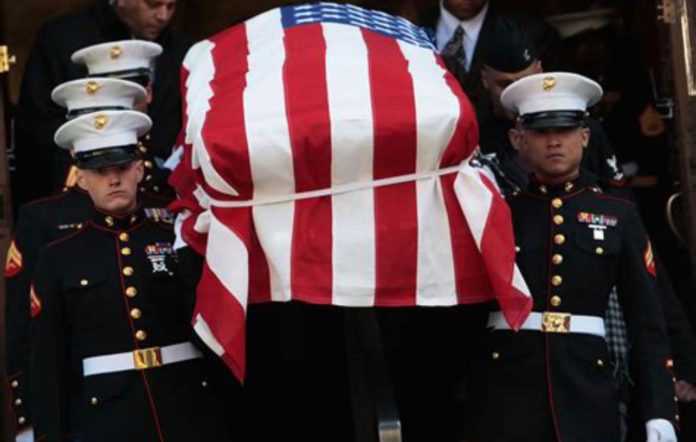
Marine NCOs and Officers are busy this week doing the most grueling job of their lives–notifying next of kin that their son or daughter will not be coming home. I asked my friend, Mark Thompson, who left the Marine Corps as a Major and served in the U.S. Department of State as the Deputy Assistant Secretary of Counter Terrorism, to tell me about his experience with delivering this kind of bad news.
The following is Mark’s account of one mission to honor a fallen Marine. I wish Mark was still with the Government. We need men like him at the wall.
By Mark Thompson
It is said once a Marine, always a Marine. That phrase certainly proved true as I first heard of the Marines and Sailor who were killed at the Kabul Airport. When I hear of such tragedies, I immediately recall my own Casualty Assistance Officer experience. Whenever a Marine is tasked with such duty, it immediately becomes his focus, no matter what his title or assignment.
I received no formal training, only the “mission order” that I had to get the notification done ASAP and do it flawlessly before news reports were released. In most cases, notification officers are selected because they are the closest to the family, not because they personally know the deceased Marine. The inexplicable bond between Marines, no matter their rank or background is what makes up for not “knowing” the Marine. That bond becomes the predicate for all that we do. That’s why all death notifications are made in person. There is no such thing as email or texting.
The call came in in February from Headquarters Marine Corps, and the unit I commanded started planning for the days that lay ahead. We arrived in the small town and after quietly notifying local law enforcement and confirming the address of the family, we found a spot to change into our service uniforms. It was about 9 pm when we knocked on the door. The first reaction from the Marine’s Mother was one of happiness since she immediately associated us with her son. Once I asked if we could come in and if her husband was home, her face dropped. When the Marine’s father came into the room, I told them their son had died. They wanted to know the circumstances and I told them. Their sobbing and screaming still sticks in my mind. The father cursed the Marine Corps and cursed himself for signing the waiver for the Marine to enlist prior to his 18th birthday. We stayed with them for quite some time and when they were ready to discuss next steps,
we went over when the body would arrive and what we would do to assist them with the funeral home (600 miles away) and what they wanted in terms of graveside honors. We also went over what funds were available to them to use for the funeral and other arrangements.I returned to our home station some 200 miles away and came back the next day to ensure we were in place to inspect the body and the casket prior to the family. We were fortunate to have done so since the body had not been properly prepared and had soiled the casket. I requested and was given funds to buy a new one. We had many hours with the family as well as the deceased Marine’s unit. The family had many questions, and the Marines were straight forward with their answers.
The day of the funeral arrived, and it was 10 degrees below zero with a stiff wind as we formed up on a hillside to prepare for honors. The Marines from my unit formed the firing squad and on signal, fired three rounds each. Taps was played. The flag was removed from the casket and crisply folded. I approached the Marine holding the flag, solemnly saluted, and took custody of it. I approached the family and stopped in front of the father. As I handed him the flag I conveyed: “On behalf of the President of the United States, the United States Marine Corps, and a grateful Nation, please accept
this flag as a symbol of our appreciation for your son’s honorable and faithful service.” I took one step back, solemnly saluted and marched away.Later we attended the church luncheon. The deceased Marine’s Father came up to me and said, “Major Thompson, I’m sorry for what I said to you that night you came to our door, I know now that the Marine Corps really does take care of its own.” I was stunned but thanked him profusely. Along with the families who have recently been notified of their Marine’s death, I think of that family I notified as they relive their own day of sorrow. Such sorrow is never erased.
Our leaders must understand the ramifications of their decisions as they risk the lives of our most precious resource, those who volunteered to stand between us and tyranny. Needless loss of life occurs when we our political and senior military
leadership ignore the consequences of their mindless decisions on the lives of those who give this nation their loved ones. May God Bless those who died for a cause that only we can make right.
The post A Marine Casualty Call – The Difficult Job of a Casualty Assistance Officer appeared first on The Gateway Pundit.


